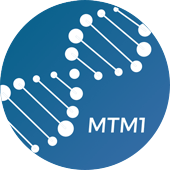Diagnostic testing for XLMTM
Confirmation of an XLMTM diagnosis requires genetic testing

Historically, muscle biopsy has been used to identify centronuclear myopathies (CNMs) like X-linked myotubular myopathy (XLMTM) by its characteristic mislocalization of nuclei and other cellular organelles.1

Electrodiagnostic testing, such as electromyography (EMG), may also be used to differentiate between myopathic (eg, XLMTM) and neuropathic (eg, spinal muscular atrophy [SMA]) diseases.

While clinical suspicion, muscle biopsy, and/or EMG may be indicative of XLMTM, genetic testing is required to confirm diagnosis.1-3
Genetic testing for XLMTM
Genetic testing for mutations in the MTM1 gene is the only definitive method for diagnosing XLMTM.1-3 Therefore, some experts recommend genetic testing as the first diagnostic test for XLMTM, with muscle biopsy to assist in the case of an uncertain result (eg, variant of uncertain significance [VUS]).4
MTM1 testing is available in the US from the following companies:
Astellas Gene Therapies is not affiliated with any of these organizations and does not endorse any particular test for MTM1. This list is not intended to be an exhaustive summary of MTM1 testing options. The information provided by Astellas Gene Therapies is for informational purposes only.

When ordering a genetic test, confirm that the MTM1 gene is included in the panel.

